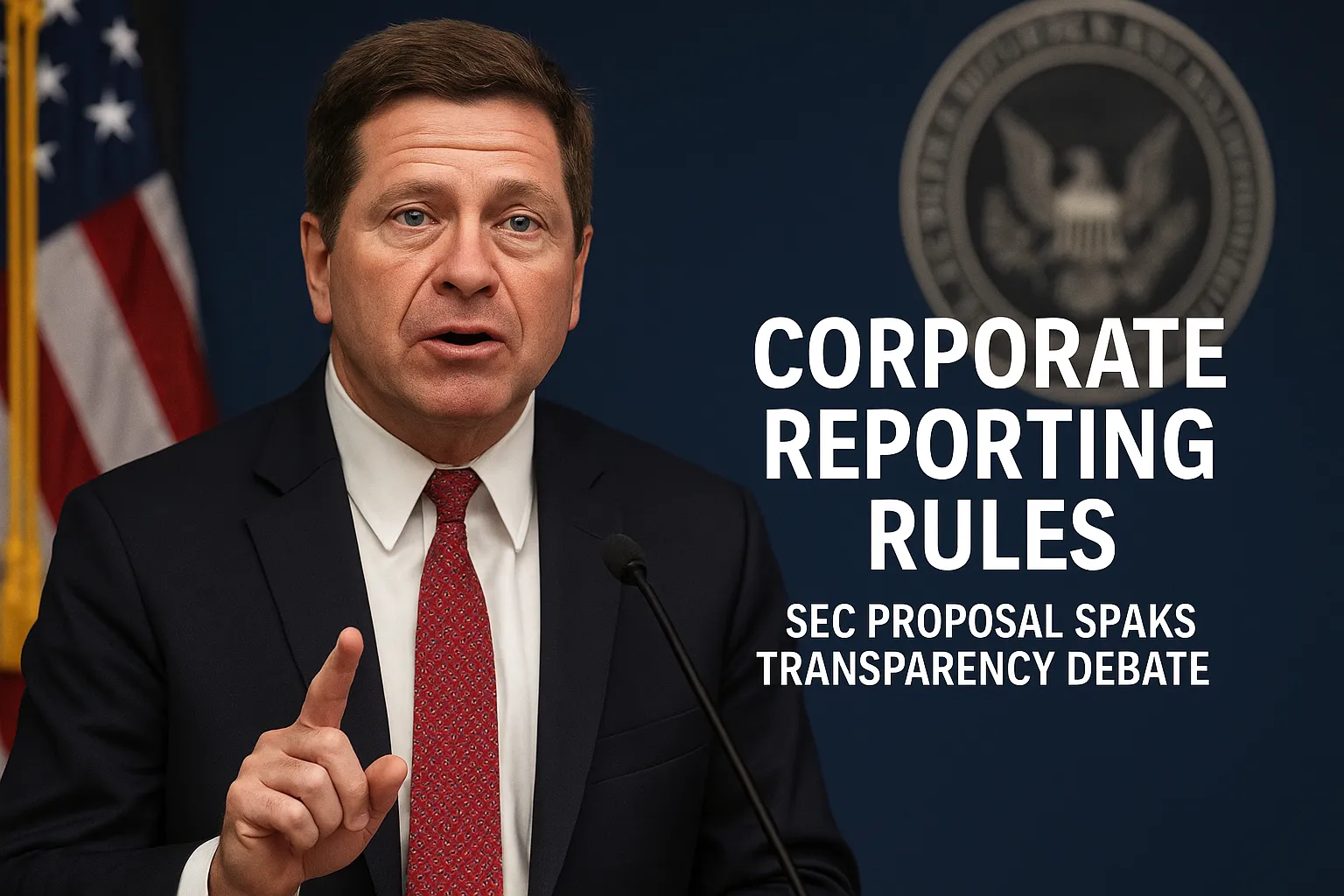The fight over corporate reporting rules is back in Washington. SEC Chairman Paul Atkins has proposed reducing company reporting from quarterly to semi-annual, aligning with President Trump’s broader deregulation agenda. The idea is sold as a way to ease burdens on corporations, but in reality, it threatens the very foundation of transparency that markets depend on. This is not modernization — it is an open invitation to corporate secrecy.
Context: The mainstream narrative
Supporters claim that quarterly reports encourage “short-termism.” They argue that Wall Street analysts and investors pressure CEOs to deliver quick profits at the expense of long-term strategy. According to Atkins, semi-annual reporting would allow companies to focus on innovation, investment, and sustainable growth.
This argument is not new. In the UK and across Europe, quarterly reports are no longer required. Policymakers there insist that fewer disclosures cut costs and allow management to focus on vision rather than bureaucracy.
The Financial Times published Atkins’ opinion piece outlining his deregulation strategy. He argued that semi-annual reporting would “unleash corporate dynamism” and better align US rules with international practice.
Oppositional Argument: Deregulation by stealth
Let’s expose the truth. This proposal does not free companies to innovate — it shields executives from scrutiny. Quarterly reports may be imperfect, but they remain one of the few tools investors can use to hold leadership accountable.
When Enron collapsed in 2001, it did so over years of manipulated numbers. When Lehman Brothers imploded in 2008, quarterly disclosures offered clues that regulators ignored. At least those clues existed. Imagine if six months had passed between reports. The rot would have spread deeper, and the reckoning would have been worse.
Reducing reporting frequency creates blind spots. In those blind spots, corruption thrives. This proposal is deregulation disguised as efficiency, a gift to corporate elites under the cover of “modernization.”
Analytical Breakdown: What is at stake
Investor protection under threat
Investors — from billion-dollar funds to ordinary retirees — rely on timely, accurate data. Shifting to semi-annual reporting doubles the period during which risks can be concealed. Debt can pile up, liabilities can remain hidden, and insider trading can flourish. By the time disclosures arrive, it may be too late.
Transparency builds confidence in markets. Strip it away, and trust evaporates.
Volatility and shocks
Quarterly updates smooth out the flow of information. Without them, markets will swing violently when semi-annual reports finally reveal surprises. A missed forecast or hidden liability will trigger larger shocks because investors had no chance to react earlier.
Political agenda disguised as policy
This is not neutral policy. It aligns perfectly with Trump’s deregulation drive: strip oversight, reduce corporate obligations, and weaken watchdogs. Atkins’ proposal is less about aligning with Europe and more about appeasing a corporate class that sees disclosure as an obstacle.
Historical parallels
- 1980s deregulation of savings and loan associations promised efficiency. It ended in scandal, fraud, and taxpayer bailouts.
- 2000s mortgage deregulation promised growth. It delivered the global financial crisis.
- Every time disclosure and oversight weakened, the consequences were measured in billions lost and lives upended.
The pattern is clear: deregulation is never neutral. It always transfers power from the public to the elite.
Human Perspective: Who really pays the price?
The victims of this proposal are not hedge funds or corporate boards — it is ordinary people.
Picture the teacher investing through her retirement fund. Picture the gig worker buying fractional shares through a mobile app. They depend on transparent quarterly data to decide when to buy, hold, or sell. Without it, they’re left blindfolded in a rigged game.
Meanwhile, insiders with access to private calls, lobbyists, and informal briefings will still know the truth months before the public. The SEC is creating two classes of investors: the privileged few and everyone else.
A deregulated market is not a free market — it is a market tilted against the small investor.
Counterarguments
Supporters insist that quarterly reporting fuels short-term thinking. They argue CEOs chase earnings every three months instead of planning for the future. But this is a smokescreen. The real problem lies in executive incentives.
If CEOs are paid based on stock price movements every quarter, they will naturally chase short-term gains. Change compensation structures, and the pressure eases. Transparency is not the enemy of long-term planning — greed is.
To weaken disclosure in the name of “innovation” is like turning off the smoke alarm because you don’t like the sound.
Expanding the lens: The global picture
Europe’s move away from quarterly reporting is often cited as proof that America should follow. But context matters. European markets rely more heavily on long-term institutional investors and less on retail trading. The US market is different — it is built on broad participation by ordinary savers.
Moreover, the European experiment has not eliminated corporate scandals. Wirecard in Germany collapsed spectacularly despite lighter reporting obligations. Fewer reports did not protect investors — they protected fraudsters.
The SEC should not blindly import policies that fit a different market structure.
Insider whispers: Lobbyists at work
Behind the polished language of “efficiency” lies the lobbying machinery of Wall Street. Corporate giants have long despised quarterly reporting because it exposes them to activist investors and public scrutiny.
According to insiders, pressure has been mounting from industry groups aligned with Trump’s deregulation agenda. Their goal is simple: weaken oversight, concentrate power, and reduce accountability. Atkins is their messenger.
The Financial Times may have given him a platform, but the real audience is corporate America. And they are listening.
Conclusion: Transparency is non-negotiable
The SEC’s mission is clear: to protect investors and maintain fair markets. By floating the idea of easing corporate reporting rules, Atkins is betraying that mission. Transparency is not a bureaucratic burden. It is the foundation of trust.
The question is stark: will the SEC stand for investors, or will it bend to corporate lobbyists? History warns us what happens when oversight is dismantled. Fraud grows, markets collapse, and ordinary citizens pay the price.
Quarterly reports are not perfect, but they are indispensable. To weaken them is to gamble with the stability of markets and the livelihoods of millions.
And once transparency is lost, trust is almost impossible to regain.
External Links
60 views






